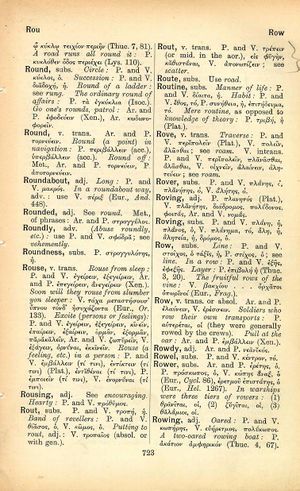rouse: Difference between revisions
From LSJ
εἰ μὴ ἦλθον καὶ ἐλάλησα αὐτοῖς, ἁμαρτίαν οὐκ εἶχον → if I had not come and spoken to them, they would not be guilty of sin
(CSV4) |
m (Woodhouse1 replacement) |
||
| Line 1: | Line 1: | ||
{{Woodhouse1 | {{Woodhouse1 | ||
|Text=[[File:woodhouse_723.jpg|thumb|link={{filepath:woodhouse_723.jpg}}]] | |Text=[[File:woodhouse_723.jpg|thumb|link={{filepath:woodhouse_723.jpg}}]] | ||
===verb transitive=== | |||
[[rouse from sleep]]: [[prose|P.]] and [[verse|V.]] [[ἐγείρειν]], [[ἐξεγείρειν]], [[Aristophanes|Ar.]] and [[prose|P.]] [[ἐπεγείρειν]], [[ἀνεγείρειν]] ([[Xenophon|Xen.]]). | |||
[[soon will they rouse from slumber you sleeper]]: [[verse|V.]] [[τάχα μεταστήσουσ' ὕπνου τόνδ' ἡσυχάζοντα]] ([[Euripides|Eur.]], ''[[Orestes]]'' 133). | |||
[[excite]] ([[person]]s [[or feelings]]): [[prose|P.]] and [[verse|V.]] [[ἐγείρειν]], [[ἐξεγείρειν]], [[κινεῖν]], [[ἐπαίρειν]], [[ἐξαίρειν]], [[ὁρμᾶν]], [[ἐξορμᾶν]], [[παρακαλεῖν]], [[Aristophanes|Ar.]] and [[verse|V.]] [[ζωπυρεῖν]], [[verse|V.]] [[ἐξάγειν]], [[ὀρνύναι]], [[ἐκκινεῖν]]. | |||
[[rouse]] (a [[feeling]], etc.) in a [[person]]: [[prose|P.]] and [[verse|V.]] [[ἐμβάλλειν]] (τί [[τινι]]), [[ἐντίκτειν]] (τί [[τινι]]) ([[Plato]]), [[ἐντιθέναι]] (τί [[τινι]]), [[prose|P.]] [[ἐμποιεῖν]] (τί [[τινι]]), [[verse|V.]] [[ἐνορνύναι]] (τί [[τινι]]). | |||
}} | }} | ||
Revision as of 08:50, 20 May 2020
English > Greek (Woodhouse)
verb transitive
rouse from sleep: P. and V. ἐγείρειν, ἐξεγείρειν, Ar. and P. ἐπεγείρειν, ἀνεγείρειν (Xen.).
soon will they rouse from slumber you sleeper: V. τάχα μεταστήσουσ' ὕπνου τόνδ' ἡσυχάζοντα (Eur., Orestes 133).
excite (persons or feelings): P. and V. ἐγείρειν, ἐξεγείρειν, κινεῖν, ἐπαίρειν, ἐξαίρειν, ὁρμᾶν, ἐξορμᾶν, παρακαλεῖν, Ar. and V. ζωπυρεῖν, V. ἐξάγειν, ὀρνύναι, ἐκκινεῖν.
rouse (a feeling, etc.) in a person: P. and V. ἐμβάλλειν (τί τινι), ἐντίκτειν (τί τινι) (Plato), ἐντιθέναι (τί τινι), P. ἐμποιεῖν (τί τινι), V. ἐνορνύναι (τί τινι).

